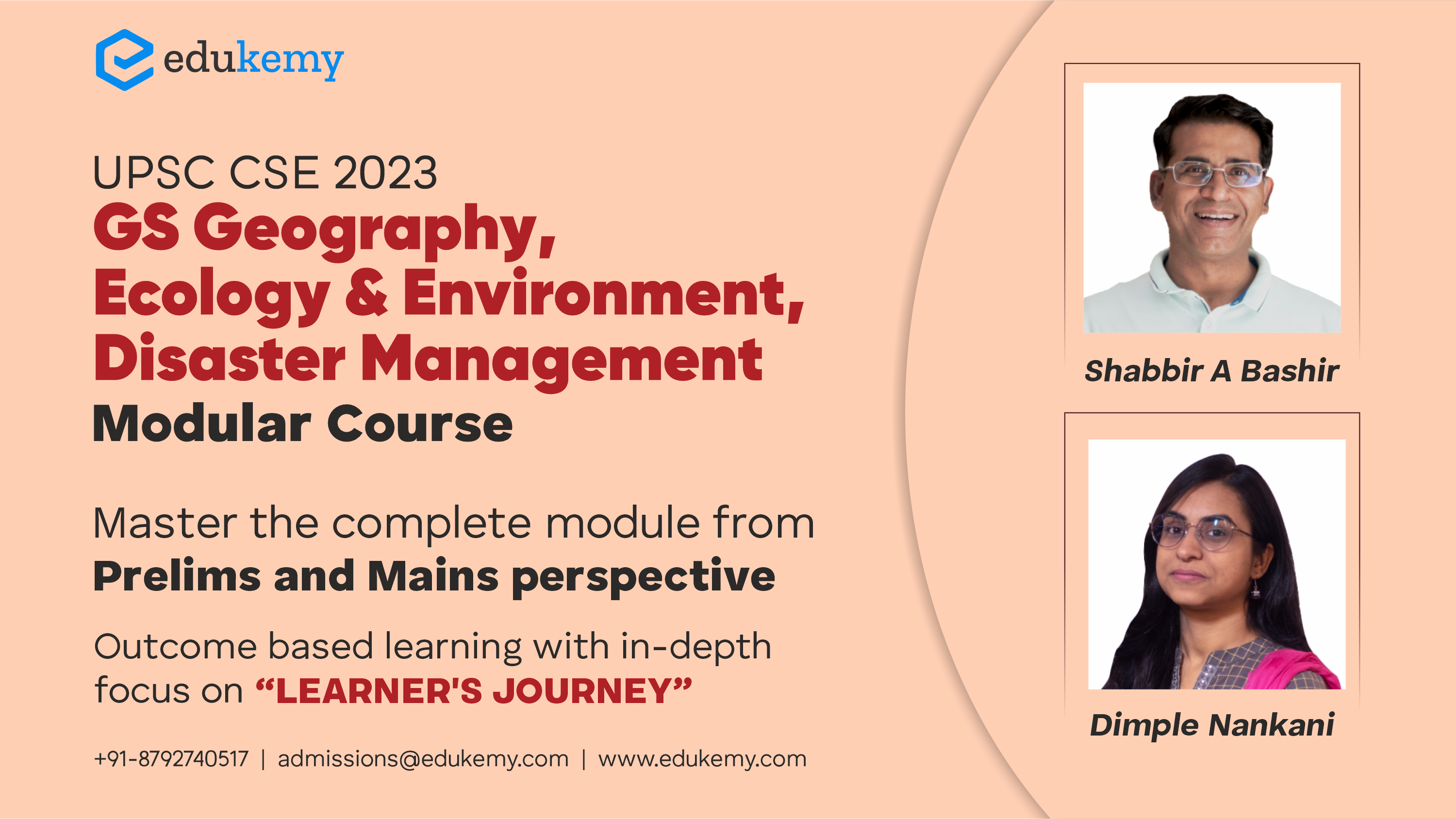
Geography Strategy – UPSC CSE Prelims Preparation
The UPSC syllabus has coverage of all essential areas of a country such as Economy, History, Geography, Science, Technology, Environment, Ecology, etc. Geography among them holds a significant weightage in the Civil Services Examination. Studying geography for the UPSC (Union Public Service Commission) exam requires a strategic and comprehensive approach to cover the vast and diverse syllabus. Firstly, candidates should familiarize themselves with the UPSC syllabus for geography, which encompasses both physical and human geography. Start by building a strong foundation through NCERT textbooks, focusing on Class 11 and 12 geography books. Simultaneously, refer to standard reference books like “Certificate Physical and Human Geography” by Goh Cheng Leong and “Geography of India” by Majid Hussain to gain an in-depth understanding of the subject. Additionally, keep abreast of current affairs, as questions in the UPSC exam often require the application of geographical concepts to contemporary issues. Utilize maps and atlases to enhance spatial awareness and practice map-based questions. Regularly solve previous years’ question papers and take mock tests to improve time management and gauge your preparation level. Group discussions and joining online forums can aid in exchanging ideas and gaining diverse perspectives on geographical topics. Finally, revision is key, and creating concise notes for quick reviews can be immensely helpful in the last stages of preparation. By adopting a holistic and disciplined study approach, aspiring candidates can increase their chances of success in the geography section of the UPSC exam.
As a Civil Servant, you are anticipated to have a thorough understanding of Indian and World geography. If you are appointed as the deputy commissioner of a district in a hill state, for example, it is crucial that you are well-versed in all aspects of the area. You should be well-versed in the features of that area, including its morphology, topography, major crops cultivated there, agricultural activities conducted there, and rivers that pass through it.
Consequently, it is essential to study geography for Prelims and get a thorough understanding of the subject. There is no doubt that geography is a difficult subject with a constrained syllabus, yet with constant effort, one can easily achieve decent marks in it. Additionally, it is covered in General Studies Paper I for the main exams,
This article will answer the most frequently asked question among IAS candidates, “How to study Geography for UPSC?” and provide some guidance on how to best or ready for the UPSC Prelims Geography test. Let us first look at the course syllabus.
How to Approach Geography for General Studies for UPSC CSE?
Contents
- 1 Syllabus
- 2 Topics to focus on
- 3 Tips to prepare effectively
- 4 Frequently Asked Questions (FAQs)
- 4.1 FAQ 1: How should I start studying Geography for UPSC?
- 4.2 FAQ 2: What are the key topics to prioritize in Geography for UPSC preparation?
- 4.3 FAQ 3: How important is map reading in Geography for UPSC, and how can I improve this skill?
- 4.4 FAQ 4: Is it necessary to supplement textbook study with other resources for UPSC Geography preparation?
- 4.5 FAQ 5: How can I integrate current affairs into my Geography preparation for UPSC?
- 5 In case you still have your doubts, contact us on 9811333901.
Syllabus
The following topics make up the geography syllabus at the Prelims level:
1. Physical, Social, and Economic Geography of India
2. Physical, Social, and Economic Geography of the World
Additionally, it includes topics that overlap, like Economics (Iron Steel industries), Environment (Types of Vegetation, National Parks), Demography with Maps, and Current Affairs. The final round of the interview will also likely include a question on geography. As a result, you should study it comprehensively.
Topics to focus on
1. Indian Geography
| Topics | Sub Topics |
| Basics of India | Location, latitude, longitude, time zone, etc. Neighbour states and their position States with international boundaries |
| Physical Features | The Himalayas-geological formation, climate, vegetation, soil, biodiversity, physiographic divisions, major passes, significance. The Great North Indian Plains-geological formation, physiographic divisions, climate, vegetation, soil, biodiversity, significance. Peninsular Plateau-geological formation, Central Highlands, Deccan Plateau Western Ghats, Eastern Ghats, Indian Desert, Coastal plains, and islands |
| River Systems | Himalayan rivers Peninsular rivers River basins Regional development and planning Hydropower projects, Major dams West-flowing and East-flowing rivers Interlinking of rivers |
| Climate | Monsoons-driving mechanism, El Nino, La Nina Seasons Cyclones |
| Minerals and Industries | Mineral Distribution Industrial Policies Location |
| Agriculture | Land utilization Types of agricultural practices Green revolution Soils and crops Irrigation Land reforms Animal husbandry Government schemes |
| Flora and Fauna | Classification of natural vegetation Rainfall distribution Biosphere reserves, national parks, etc. Red-listed species |
| Economic Infrastructure | Transportation (highways, inland waterways, etc.) Power and energy sector Conventional and non-conventional sources of energy Energy conservation |
| Human Geography | Demographics (Poverty, Hunger, Literacy Rates, Unemployment, etc) Recent Census |
2. World Geography
Major natural regions, the Regional geography of developed countries and developing countries, and the regional geography of South Asia.
3. Physical Geography
| Topics | Sub Topics |
| Geomorphology | Origin of the earth Interior of the earth Types and characteristics of rocks Folding and Faulting Volcanoes, earthquakes Interior of the earth Weathering Landforms formed by fluvial, aeolian, and glacial actions |
| Climatology | Atmosphere structure and composition Temperature Pressure belts Wind systems Clouds and types of rainfall Cyclones and anti-cyclones Major climatic types |
| Oceanography | Ocean relief Temperature, salinity Ocean deposits Ocean currents El Nino and La Nina Waves and tides |
| Biogeography | Soil-origin and types Major biomes of the world Ecosystem, food chain Environmental degradation and conservation |

Tips to prepare effectively
1. NCERT
Use NCERT for a solid foundation to study Geography. Covering classes VIII to XII in NCERT for Geography will cover the basics and fundamentals of all topics in an easy and comprehensible way.
2. Additional resources
Once you are done studying using NCERT, get an in-depth understanding of the topics in geography using guides and additional texts. The ones given below are highly recommended:
1. Certificate Physical and Human Geography by Goh Cheng Leong
2. India: A Comprehensive Geography by DR Khullar
3. Physical Geography by Savindra Singh
4. Models in Geography by Majid Husain
5. Geographical Thought by R D Dixit
3. Map preparation
Maps are vital to study for in Geography and most questions are directly or indirectly linked with maps so have a thorough knowledge of maps to ensure you get good scores. Study the maps in NCERT books and additional resources and try to test yourself for practice.
Mapping Strategy: How to Attempt Map-Related Questions in UPSC CSE Preparation?
4. Previous year Question Papers
it is imperative you test yourself by doing past question papers since it will show you what type of questions are being asked. By solving multiple question papers, you can figure out a pattern behind the questions and what topics are asked more regularly. You will also find out what type of answers they are expecting.
5. Current affairs
Make sure you connect current affairs to Geography since they will expect you to do so during the exams. So many articles in newspapers have direct connections to geography so ensure you read it.
6. Make notes
Make sure to make notes on all the topics to use during the last few months before the exams to revise. Having notes to constantly look over also ensures you retain the information you have studied.
The Civil Services Examination is not easy. It requires dedication, time, challenging work, and a lot of preparation. Make sure not to take it lightly and prepare well.

Frequently Asked Questions (FAQs)
FAQ 1: How should I start studying Geography for UPSC?
Answer: Begin by understanding the UPSC syllabus for Geography, which includes both physical and human geography. Start with basic textbooks like NCERTs to build a strong foundation. Focus on map reading skills and current affairs related to geography.
FAQ 2: What are the key topics to prioritize in Geography for UPSC preparation?
Answer: Prioritize topics like Indian and World Physical Geography, Indian and World Human Geography, Environmental Geography, and Geopolitics. Additionally, pay attention to current events and their geographical implications, as UPSC often integrates contemporary issues into the exam.
FAQ 3: How important is map reading in Geography for UPSC, and how can I improve this skill?
Answer: Map reading is crucial for UPSC Geography. Practice regularly with atlases, mark important locations, and understand the spatial relationships between different regions. Focus on political, physical, and thematic mapping to enhance your map reading skills.
FAQ 4: Is it necessary to supplement textbook study with other resources for UPSC Geography preparation?
Answer: While textbooks provide a solid foundation, it’s beneficial to supplement your study with reference books, online resources, and current affairs magazines. Use standard reference books for in-depth understanding and follow reliable online platforms for updated information.
FAQ 5: How can I integrate current affairs into my Geography preparation for UPSC?
Answer: Stay updated with geographical developments in newspapers, magazines, and online portals. Relate current events to geographical concepts and issues. Make a habit of jotting down notes on the geographical aspects of major news, helping you integrate current affairs seamlessly into your preparation.
In case you still have your doubts, contact us on 9811333901.
For UPSC Prelims Resources, Click here
For Daily Updates and Study Material:
Join our Telegram Channel – Edukemy for IAS
- 1. Learn through Videos – here
- 2. Be Exam Ready by Practicing Daily MCQs – here
- 3. Daily Newsletter – Get all your Current Affairs Covered – here
- 4. Mains Answer Writing Practice – here

